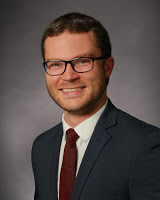I am Chris McComb, and This is How I Work
 Today, I have the pleasure of interviewing Dr. Chris McComb. Dr. McComb is an assistant professor in the School of Engineering Design, Technology and Professional Programs at Penn State University. He holds courtesy appointment in mechanical engineering and industrial engineering and is an affiliate faculty of the Institute for CyberScience. McComb attended California State University-Fresno and received dual B.S. degrees in Civil and Mechanical Engineering (2012). He later attended Carnegie Mellon University as a National Science Foundation Graduate Research Fellow and obtained his M.S. (2014) and Ph.D. (2016) in Mechanical Engineering. McComb’s research examines the interface between humankind and the technology and products that we create, with topics ranging from team methodology, social choice theory, machine learning, and computational synthesis. He teaches courses in design innovation, engineering design, and decision-making.
Today, I have the pleasure of interviewing Dr. Chris McComb. Dr. McComb is an assistant professor in the School of Engineering Design, Technology and Professional Programs at Penn State University. He holds courtesy appointment in mechanical engineering and industrial engineering and is an affiliate faculty of the Institute for CyberScience. McComb attended California State University-Fresno and received dual B.S. degrees in Civil and Mechanical Engineering (2012). He later attended Carnegie Mellon University as a National Science Foundation Graduate Research Fellow and obtained his M.S. (2014) and Ph.D. (2016) in Mechanical Engineering. McComb’s research examines the interface between humankind and the technology and products that we create, with topics ranging from team methodology, social choice theory, machine learning, and computational synthesis. He teaches courses in design innovation, engineering design, and decision-making.
Current Job: Assistant Professor of Engineering Design
Current Location: University Park, PA, USA
Current mobile device: iPhone 8+
Current computer: Apple MacBook Pro
Can you briefly explain your current situation and research to us?
I’m a tenure-track assistant professor in the School of Engineering Design, Technology, and Professional Programs at Penn State University. I co-direct the Technology and Human Research in Engineering Design (THRED) Group with Dr. Jessica Menold, where we study the interface between humankind and the systems that we create. I’m specifically interested in (1) designing organizations and teams to optimize enterprise-level as well as individual goals, (2) creating tools that allow engineers and designers to create more intelligent and performant products, and (3) addressing fundamental issues that will enable hybrid teams of humans and machines/computers.
What tools, apps and software are essential to your workflow?
The tools that I use fall into three categories: management, development, and writing. In the management category I use Basecamp (project management program that includes chat, file storage, task management) and Box (file syncing).
In the development category I primarily use PyCharm (development environment for Python software), Atom (a lightweight text editor when I don’t need the full power of PyCharm), and Github (version control for software projects).
Finally, in the writing category, I use Mendeley for citation and reference management in conjunction with Microsoft Word.
What is your best advice for productive academic work?
Always keep a few small, mindless tasks handy. Whenever I get stuck on a problem and start banging my head against the wall it’s nice to do something easy and simple yet still productive.
Which skill makes you stand out as an academic?
I think that I have a talent for building computational models of complex systems. I’ve built accurate models of engineering design teams, sequence learning behavior, composite structures, and wave energy converters. It’s easy to make an accurate model if you include everything under the sun, but those models take forever to run. My talent is finding the most meaningful and salient phenomena to include in the mode to strike an optimal balance between accuracy and runtime.
What do you listen to when you work?
That depends on the type of work that I’m doing. If I’m writing or editing I usually listen to grey noise because it helps me focus. For other tasks I listen to an idiosyncratic combination of music ranging from electronica, rap, rock, and pop.
What are you currently reading? How do you find time for reading?
I’m reading three books: Lord of California by Andrew Valencia, Uncommon Type by Tom Hanks, and Whistling Vivaldi by Claude Steele. Most of my reading gets done when I travel, or right before I go to sleep.
Are you more of an introvert or extrovert?
I’m an extrovert. I love to meet with my colleagues in different departments to talk about new ideas and its always exciting to skype with a potential collaborate who I’ve never met before! I try to use these meetings like fuel to get me through the day. That being said, I still get nervous during networking events and conferences. For some reason I find it difficult to be extroverted in that context.
What’s your sleep routine like?
I usually manage to get about 7 hours of sleep per night (roughly 10PM to 5AM).
What’s your work routine like?
I make it a point to work 7AM-5PM Monday-Friday (except for vacations and mental health days, of course). Trying to focus my work during those hours helps me keep my evenings and weekends free, but near deadlines I end up working earlier/later/more. My objective is usually to work more efficiently rather than just working more.
What’s the best advice you ever received?
When I was getting close to finish my dissertation, my advisor (Ken Kotovsky) told me that “Every research publication is just a progress report.” That has really stuck with me. Most academics have a tendency towards perfectionism, but we also have to contend with deadlines! Nothing is ever going to be perfect and being able to accept “good enough for now” is a valuable skill.
